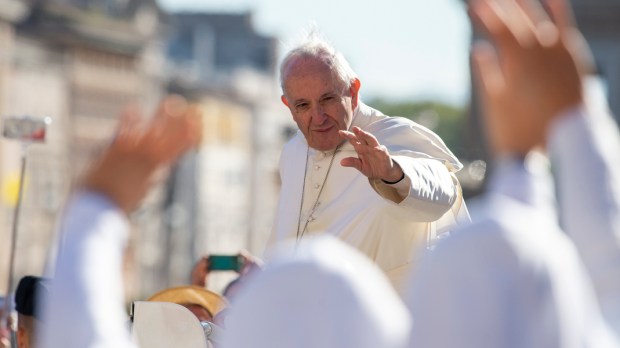Pope Francis today dedicated the address of his general audience to a recap of last weekend’s apostolic trip to Lithuania, Latvia and Estonia, made on the occasion of the centenary of the Baltic States’ independence.
“A hundred years, half of which they lived under the yoke of occupations, first the Nazi and then the Soviet occupation. They are peoples who have suffered greatly, and for this reason the Lord looks upon them with special favour. I am sure of this,” the pope said.
The pontiff noted how he followed the footsteps of John Paul II in making the trip, but that his “took place in a very different context to that which Saint John Paul II encountered.”
He said he was there to announce that “freedom is not enough,” since love is what gives meaning to life, and that the Gospel, “in the time of freedom is the light for the daily path of people, of families and of societies, and is the salt that gives flavour to ordinary life and preserves it from the corruption of mediocrity and selfishness.”
In Lithuania, Catholics are the majority, while in Latvia and Estonia, Lutherans and Orthodox prevail, though many are non-practicing.
Francis thus said that ecumenism was an intrinsic dimension of the trip.
He also spoke of the contribution the three nations give to Europe: “a contribution of human and social values that have passed through the crucible of hardship.”
Generations
Francis noted how he encouraged dialogue between the generations, and had two specific meetings dedicated to the young and the elderly.
“Those who have passed through difficult trials are the roots of a people, to be safeguarded with the grace of God, so that the new shoots may draw from them and bear fruit,” he said.
As well, the Holy Father in Vilnius paid homage to the victims of the Jewish genocide in Lithuania, exactly 75 years after the closure of the great Ghetto, which was the antechamber of death for tens of thousands of Jews.
He also visited the Museum of Occupations and Freedom Fights: “I paused in prayer precisely in the rooms where those who opposed the regime were detained, tortured and killed. They killed more or less forty a night. It is affecting to see how far human cruelty can go. Let us think about this,” he invited.
Regimes come and go, the pope continued, but “Mary Mother of Mercy continues to watch over her people, as a sign of sure hope and consolation.”

